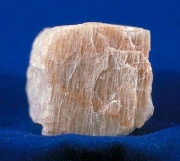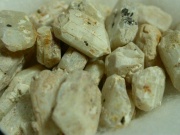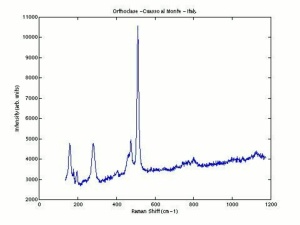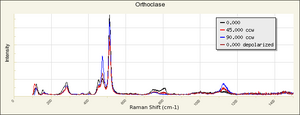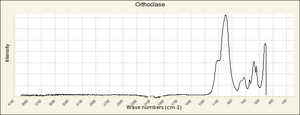Difference between revisions of "Orthoclase"
| Line 7: | Line 7: | ||
potash feldspar; adularia; moonstone; sanidine; microcline; amazonstone; amazonite; ortoclasa (Esp.); orthoclase(Fr.); ortose (Port.); Orthoklas (Deut.); orthoclaas (Ned.) | potash feldspar; adularia; moonstone; sanidine; microcline; amazonstone; amazonite; ortoclasa (Esp.); orthoclase(Fr.); ortose (Port.); Orthoklas (Deut.); orthoclaas (Ned.) | ||
| − | [[[SliderGallery rightalign|Orthoclase Raman RRUFF R040055.png~ | + | [[[SliderGallery rightalign|Orthoclaseitaly1.jpg~Raman (U of Parma)|Orthoclase Raman RRUFF R040055.png~Raman (RRUFF)|Orthoclase IR-ATR RRUFF R040055.png~IR-ATR (RRUFF)]]] |
==Physical and Chemical Properties == | ==Physical and Chemical Properties == | ||
Revision as of 12:41, 26 December 2022
Description
A common type of Feldspar composed of potassium aluminum silicate. Orthoclase is found in many igneous rocks worldwide. It is generally a white or pale pink in color and has two good cleavage planes at right angles. Pure orthoclase is called adularia. Orthoclase with an intergrowth of albite has a pearly opalescence and is called Moonstone. It is used as a gemstone. Sanidine is a glassy type of orthoclase. Orthoclase has been used since ancient times for beads. It is also used in the manufacture of glass, porcelain and enamels.
Synonyms and Related Terms
potash feldspar; adularia; moonstone; sanidine; microcline; amazonstone; amazonite; ortoclasa (Esp.); orthoclase(Fr.); ortose (Port.); Orthoklas (Deut.); orthoclaas (Ned.)
Physical and Chemical Properties
- Monoclinic system; twinned crystals common
- Perfect cleavage in two directions (right angles)
- Fracture = uneven to splintery
- Luster = vitreous
- Streak = white
- Pleochroism = usually none; may be weak in yellow stones
- Fluorescence = inert to weak; different shades of body color
- May show adularescence or aventurescence
- Dispersion = strong
| Composition | KAlSi3O8 |
|---|---|
| Mohs Hardness | 6.0 - 6.5 |
| Density | 2.55 - 2.63 g/ml |
| Refractive Index | 1.518 - 1.526 |
| Birefringence | 0.005 - 0.008 |
Comparisons
Properties of Common Gemstones
Resources and Citations
- Mineralogy Database: Orthoclase
- Gem Identification Lab Manual, Gemological Institute of America, 2016.
- Jack Odgen, Jewellery of the Ancient World, Rizzoli International Publications Inc., New York City, 1982
- Encyclopedia Britannica, http://www.britannica.com Comment: "orthoclase" [Accessed December 4, 2001]
- C.W.Chesterman, K.E.Lowe, Audubon Society Field Guide to North American Rocks and Minerals, Alfred A. Knopf, New York, 1979
- Wikipedia: Orthoclase (Accessed Sept. 14, 2005 and Dec 2022)
- G.S.Brady, Materials Handbook, McGraw-Hill Book Co., New York, 1971 Comment: p. 316
- Van Nostrand's Scientific Encyclopedia, Douglas M. Considine (ed.), Van Nostrand Reinhold, New York, 1976
- Random House, Webster's Encyclopedic Unabridged Dictionary of the English Language, Grammercy Book, New York, 1997
- The American Heritage Dictionary or Encarta, via Microsoft Bookshelf 98, Microsoft Corp., 1998
